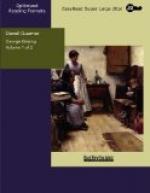For many years Mr. Mumbray had looked to the Mayoralty as the limit of his ambition. He now began to entertain larger projects, encouraged thereto by the dissensions of Conservative Polterham, and the promptings of men who were hoping to follow him up the civic ladder. He joined with those who murmured against the obstinacy of old Mr. Welwyn-Baker. To support such a candidate would be party suicide. Even Welwyn-Baker junior was preferable; but why not recognize that the old name had lost its prestige, and select a representative of enlightened Conservatism, who could really make a stand against Quarrier and his rampant Radicals? Mr. Mumbray saw no reason why he himself should not invite the confidence of the burgesses.
In a moment of domestic trace the ex-Mayor communicated this thought to his wife, and Mrs. Mumbray gave ready ear. Like the ladies of Polterham in general, she had not the faintest understanding of political principles; to her, the distinction between parties was the difference between bits of blue and yellow ribbon, nothing more. But the social advantages accruing to the wife of an M.P. impressed her very strongly indeed. For such an end she was willing to make sacrifices, and the first of these declared itself in an abandonment of her opposition to Mr. Eustace Glazzard. Her husband pointed out to her that a connection with the family so long established at Highmead would be of distinct value. William Glazzard nominally stood on the Liberal side, but he was very lukewarm, and allowed to be seen that his political action was much swayed by personal considerations. Eustace made no pretence of Liberal learning; though a friend of the Radical candidate (so Quarrier was already designated by his opponents), he joked at popular enthusiasm, and could only be described as an independent aristocrat. Money, it appeared, he had none; and his brother, it was suspected, kept up only a show of the ancestral position. Nevertheless, their names had weight in the borough.
Eustace spent Christmas at Highmead, and made frequent calls at the house of the ex-Mayor. On one of the occasions it happened that the ladies were from home, but Mr. Mumbray, on the point of going out, begged Glazzard to come and have a word with him in his sanctum. After much roundabout talk, characteristically pompous, he put the question whether Mr. Glazzard, as a friend of Mr. Denzil Quarrier, would “take it ill” if he, Mr. Mumbray, accepted an invitation to come forward as the candidate of the Conservative party.
“I hope you know me better,” Glazzard replied. “I have nothing whatever to do with politics.”
The ex-Mayor smiled thoughtfully, and went on to explain, “in strictest confidence,” that there was a prospect of that contingency befalling.
“Of course I couldn’t hope for Mr. William’s support.”
He paused on a note of magnanimous renunciation.
“Oh, I don’t know,” said Glazzard, abstractedly. “My brother is hardly to be called a Radical. I couldn’t answer for the line he will take.”




